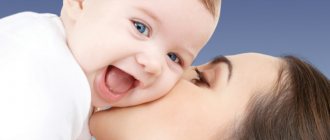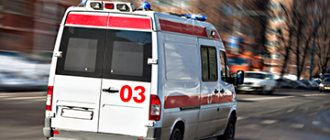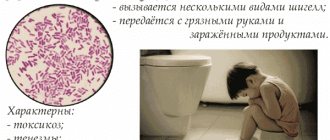About diarrhea
What diarrhea looks like in a newborn is something you should definitely talk about. After all, judging diarrhea in a baby by the number of bowel movements is wrong. So, you need to pay attention first of all to the color of the stool. If it has changed and become an uncharacteristic color - green or bright yellow - this is a reason to consult a doctor. It is also necessary to call a doctor if the child’s stool contains blood, mucus, or watery stools. Well, the baby’s fairly frequent bowel movements can also cause concern: if he does this in small portions more than 8 times a day, this is another alarming sign.
Rules for the treatment of diarrhea in children
When treating diarrhea in children, you need to be careful and study the causes and factors that provoke the disease.
General rules:
- It is not recommended to start treatment with antibiotics if the source of the disease is not bacterial. Their use will only aggravate the problem and can cause dysbacteriosis.
- The most important thing to worry about is dehydration, which can disrupt the functioning of organs and lead to the death of the baby in a short period of time. An important factor is to drink plenty of fluids in quantities appropriate to the child’s age.
- You need to start providing an adequate amount of fluid to the child’s body immediately, during the first hours of diarrhea, in order to compensate for the lost fluid.
- It is more convenient to use solutions as liquids, powders for the preparation of which are available in the pharmacy. If this is not possible at the moment, you can prepare the solution yourself. For this, 1 tsp. salt and 5-6 tsp. sugar is diluted in one liter of boiling water. The maximum storage time for the solution is one day.
- If diarrhea develops in a breastfed baby, it is important to ensure that the baby is fed frequently.
We recommend reading
- What color is the stool during teething?
- How many days does diarrhea last for rotavirus in children?
- Diet for diarrhea without fever in a child
It is strictly forbidden to give your child sweet water with gases, juice, teas, or dairy products. They can only worsen dehydration.
Accompanying symptoms
Diarrhea in a newborn may also be accompanied by the following symptoms:
- Increased body temperature (up to approximately 38 ° C).
- Vomit.
- Lethargy, drowsiness.
- Stomach ache.
- Release of gases.
- Rough spots may appear on the baby's body. The cheeks, elbows, abdomen and legs of the newborn are most often affected.
If your baby experiences at least a couple of the above symptoms, you should definitely consult a doctor, even if there has been no diarrhea yet.
Treatment of a child with medications
It is important to start treatment correctly. The first thing you need to give your baby for diarrhea is any of the saline solutions:
- Regidron.
- Citroglucosolan.
- Oralit.
- Gastrolit.
- Enterodesis.
- Glucosan.
A packet of the medicinal mixture must be dissolved in boiled drinking water at room temperature. You can also give your child a glucose solution. These drugs prevent dehydration of the body.
If diarrhea is accompanied by an increase in body temperature, then you need to give a drug containing paracetamol or ibuprofen. For one-year-old children there is a release form in candles; for older children, tasty suspensions are suitable.
But, of course, salt solutions alone cannot solve the problem. The main medicine for diarrhea is sorbents that remove toxins from the body:
- Smecta.
- Activated carbon.
- Enterosgel (difficult to drink, but highly effective).
- Polyphepan.
- Neosmectin.
- Polysorb.
You can also give symptomatic medications for diarrhea:
- Diarol.
- Calcium carbonate.
- Imodium.
- Tanalbin.
- Bismuth.
You need to understand that diarrhea can be caused by a variety of reasons, and treatment should be chosen according to the specific cause.
If diarrhea is caused by a serious illness, then most likely it will not be possible without hospitalization.
If a gastrointestinal tract disorder is caused by dysbiosis, then effective remedies for diarrhea will be drugs to normalize the intestinal microflora:
- Linux.
- Acipol.
- Bifiform.
- Colibacterin.
- Bificol.
- Lactobacterin.
- Bifidumbacterin.
- Bifilin.
- Enterol and a lot of other probiotics and bacteriophages.
To cure diarrhea in a child caused by intestinal infections, antibiotics are prescribed:
- Nevigramon.
- Ercefuril.
- Furazolidone.
- Gentamicin.
- Kanamycin.
- Rifampicin.
- Tienam.
- Meronem.
- Anamycin sulfate.
- Ciprofloxacin.
Important! Self-prescribing and treating diarrhea with antibiotics is strictly prohibited for adults, and especially for children. This applies in particular to such a widely known drug as Levomycetin. Remember that Levomycetin is not a remedy for diarrhea, it is a powerful broad-spectrum antibiotic.
Sometimes enzyme therapy is used for treatment:
- Pancreatin.
- Mezim forte.
- Festal.
- Creon.
- Pankurman.
- Panzinorm forte.
- Abomin-pepsin.
It would be a good idea to give your child antiallergic (antihistamine) medications:
- Erius.
- Zodak or any other suitable for children.
If diarrhea is accompanied by pain, the child is given antispasmodics:
- Drotaverine.
- No-Shpa.
- Papaverine.
- Spasmoman.
Causes
Why might diarrhea occur in a newborn? Many mothers think that if the baby is breastfed, he is in virtually no danger. However, it is not. The very first cause of diarrhea in a baby (if the child is breastfed) is the mother's diet. That is, what the mother eats, the child also consumes, only in processed form. Among the causes of diarrhea in infants are also intestinal infections and poor hygiene.
Severe diarrhea with mucus or blood
Such diarrhea in a newborn most often occurs as a result of poisoning. That is, we can say that there is a viral or bacterial infection in the intestines. Doctors usually detect salmonellosis, enterovirus, shigellosis or rotavirus in a newborn. The route of infection in such children is fecal-oral. That is, the reason may be both the mother’s nutrition and dirty hands, which the baby can “pull” into her mouth.
Constant diarrhea
It is characterized by poor weight gain, bloating of the baby's tummy, and rash. The reason may be various kinds of allergic reactions (for example, to lactose) or intestinal dysbiosis. In some cases, similar problems can be observed in those children who have certain congenital diseases associated with the metabolic process.
Infant stool: norm and deviations
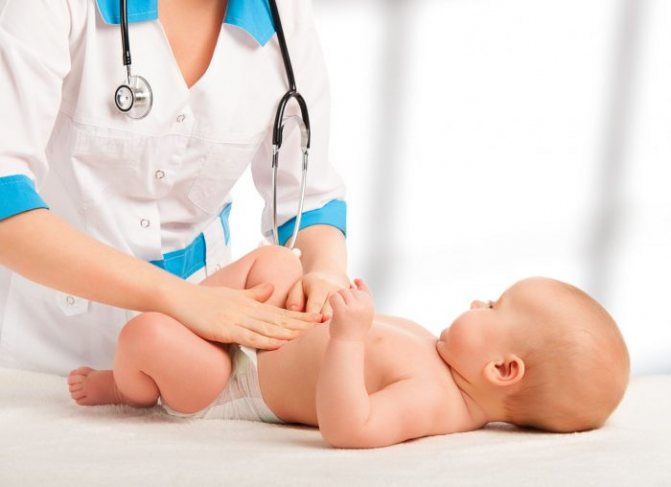
Feces in the first weeks and months of a child’s life are the most reliable express method for assessing the health of a baby. Newborn babies are born with a “sterile” digestive tract. It lacks beneficial bacteria and microorganisms involved in digestion processes. During the first four to five weeks, babies have bowel movements four to nine times a day. The act of defecation, as a rule, occurs immediately after feeding.
If a newborn is breastfed, loose stools of a pasty consistency and yellow diarrhea in the first two to three weeks of a child’s life are a completely natural physiological phenomenon. Children up to 12-14 months consume mainly liquid foods (mother's milk, infant formula). Therefore, if the baby feels well, is gaining weight, there are no foreign impurities in the stool, and the diarrhea is yellow or light greenish in color, there is no need to worry.
If the baby is bottle-fed, the feces are yellow-golden, light brown, greenish in color, and have a thicker, viscous consistency. A small amount of mucus in the stool is acceptable. The number of bowel movements from one month to six months is 3-4 times a day.
Important! The danger for infants is not diarrhea, which, in fact, has a protective function by freeing the intestines from decay products, but rather the loss of fluid, microelements, vitamins, and electrolytes. This condition can lead to disruption of the functioning of organs and systems of the body.
In the first 40-48 hours after birth, a newborn’s stool has a dark brown, brown, black-greenish color, a sour-milky smell when breastfeeding, and a rather unpleasant specific smell if the baby receives artificial nutrition. This is a normal physiological phenomenon.
As they grow older, after five to six months, the baby's stool acquires a firmer consistency, rich green, golden, light brown in color with a small amount of mucus.
The alarm should be sounded when the stool becomes too dark or light in color, the feces exude a specific fetid (putrefactive) aroma, they contain a large amount of mucus, and bloody discharge. At the same time, the baby does not gain weight, quickly loses weight, refuses food, is constantly capricious, and cries. Body temperature may be increased to 37.5-38 degrees, other non-characteristic symptoms.
Dangers
Diarrhea in a newborn baby is a very dangerous phenomenon. The thing is that with this disease, not only many important nutrients are removed from the baby’s body, but also liquid. And this is fraught with dehydration of the body. In this case, the baby’s eyes may become sunken, mucous membranes may dry out, and lips may crack. The color of the urine may also change: it will become dark yellow, and the amount of urine will decrease significantly. In addition to dehydration, vomiting (an accompanying symptom of diarrhea) is also dangerous for a baby, since, constantly being in a supine position, the baby can choke on his own vomit.
What should mom do first?
If a newborn has diarrhea, what should you do in this case? Even before the doctor arrives, the mother must collect the contents of the baby’s stool in a jar. This is very important, because only feces alone (their color, consistency) can make a preliminary diagnosis. After each bowel movement, the baby must be washed. In case of diarrhea, it is best to avoid using wet baby wipes as a means of hygiene. After all, their frequent use can lead to irritation of the baby’s skin and the occurrence of allergic reactions. Well, the main thing that every mother should remember is that treatment of diarrhea in newborns can only be started with the doctor’s permission. Self-medication in this case can be extremely dangerous. Only after a specialist arrives and makes a diagnosis can you begin drug treatment for the child. It is also important to remember that traditional medicine for a newborn baby can be no less dangerous than illiterate or self-prescribed medications.
What to take care of?
If a newborn has diarrhea, what should the mother do to avoid harming the baby?
- Adjust your diet (if the baby is breastfed). In this case, the mother should go on the same diet that she would stick to if she had diarrhea. It is necessary to completely exclude dairy and fermented milk products, fatty foods, and semi-finished products from the diet. In this case, it is good for mom to consume light soups, boiled vegetables and cereals. You will also have to give up fresh fruit.
- Assess the degree of dehydration of the baby. In case of diarrhea in a baby, the mother should carefully monitor the condition of her child. If he remains cheerful and active, there is no need to worry. However, if the baby has become lethargic, sleepy, and has stopped writing, you need to start actively feeding the baby some water in order to avoid such a terrible problem as dehydration.
- Watch your weight. Every mother should remember that a decrease in baby weight by 5% is a dangerous phenomenon, and by 10% it is completely pathological. So if a child has lost at least a little weight, this, again, may indicate dehydration.
- Feeding the baby. If the baby has diarrhea, the baby still needs to be fed. If the baby is breastfed, the number of snacks he eats should not decrease, but the amount of food consumed should be less. If it is artificial, during this period its mixture must be diluted by half with water, the portions are also reduced in volume.
The main causes of diarrhea in infants
The body of an infant is still imperfect, and all its systems are not developed enough to fully withstand any irritating factors. Therefore, even a banal climate change can provoke diarrhea in an infant. What can we say about more serious health threats.
So, the main causes of diarrhea in a newborn:
- Dysbacteriosis. The condition is typical for babies in the first month of life, when the digestive tract is forming. Beneficial microflora populates the intestinal tract gradually, and it is not yet enough to fully resist even the slightest irritants. And any failure of this process is manifested by yellow liquid stool.
- Overfeeding. Diarrhea in a newborn during breastfeeding may be a reaction to an excess amount of breast milk, which simply does not have time to be processed. In this situation, the body simply gets rid of excess food through accelerated bowel movements.
- Teething. Nervous stress due to painful sensations, crying, poor sleep and inflammation in the baby’s gums impairs the process of assimilation of formula or breast milk. Such loose stools in infants are not dangerous. However, this does not eliminate the need to monitor the child’s condition to prevent dehydration.
- Reaction to complementary foods. Usually, with the introduction of new foods in the diet, feces become thicker and more formed. But this will happen a little later, when the amount of dense food is increased. And at first, a reverse reaction is quite possible. Most likely, loose stools will occur in a breastfed baby. Artificial children tolerate this process somewhat easier.
- Food poisoning, intestinal infection. This reason can cause diarrhea in a child 8 months and older. The possibility of infection at a younger age cannot be completely ruled out. But during the period of active knowledge of the world around us, the risks increase significantly.
- Viral diseases, inflammatory processes. Diarrhea in a baby can appear as one of the symptoms of the disease, or as a response to treatment, in particular with antibacterial drugs.
- Allergy. In the case of diarrhea in a baby as an allergic reaction, it is complemented by other symptoms. Among them are redness and itching in the anus, the presence of small rashes.
We recommend: What antibiotics and how to use them for diarrhea in children?
If a child under one year old has diarrhea, it is extremely important to analyze his behavior and nutrition the day before. If there are no other symptoms of illness, the baby generally feels well and is active, most likely there is no cause for concern. This does not replace consultation with a pediatrician, but there is no need to worry again. There is no need to convey your anxiety to the baby.
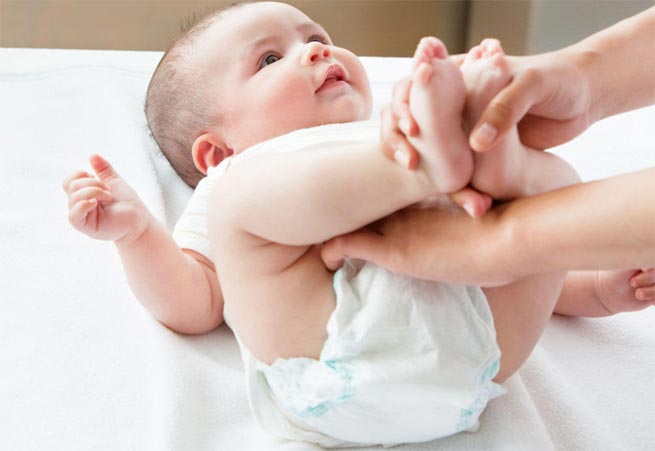
Dehydration
Treatment of diarrhea in newborns should take place in parallel with maintaining the water-salt balance in the baby’s body. This is very important, since dehydration can lead to various problems and irreversible consequences. What should be done in this case?
- The newborn should be put to the breast as often as possible. Mother's milk completely replaces the baby's food and drink. So if you don’t want to give your baby some water, you need to breastfeed him as often as possible.
- If your baby has the first signs of dehydration, you should definitely give the baby a medication like Smecta (it can even be given to newborn babies). This mixture should be drunk in small portions approximately every 20 minutes.
- Hillak is also safe for infants. It is taken before meals, approximately 15 drops. It will help cope with dehydration and also tidy up the intestinal microflora.
Medicines
Parents may be interested in the question: “What should I give my newborn for diarrhea?” So, you can safely give your baby the following medications:
- The drug “Smecta”, which will help maintain the water-salt balance of the baby’s body in a normal state.
- You can also give your child sorbents. This could be the drug Enterosgel. However, it is best to use it with a doctor's prescription. The purpose of this remedy is to remove toxins from the baby’s body rectally.
- The drug "Hillak", which normalizes intestinal microflora.
All other medications should be prescribed exclusively by a doctor, depending on the diagnosis and causes of diarrhea. What is given to newborns for diarrhea with the permission of doctors?
- These may be drugs based on the bacterium Bacillus subtilis. The human body does not have such bacteria, so it must be introduced from the outside. It fights infection and helps normalize the functioning of the affected mucosa.
- If the baby’s body is severely damaged during diarrhea, the doctor may prescribe a course of lacto- or bifidobacteria. You can use a drug such as Lactulose.
Folk remedies
What to do if newborns have diarrhea? Our great-grandmothers can tell us how to treat children with this disease. After all, you can also cope with the problem using traditional medicine. However, first I would like to say that modern medicine rejects any non-drug treatment for newborns, as this can be dangerous to the health of the baby.
- You can prepare a special medicinal decoction. To do this, pour a tablespoon of lingonberry leaves into a glass of boiling water, boil everything for about 5 minutes, leave for about an hour. Next, the medicine is given to the child one teaspoon approximately 10 times a day.
- Fresh lingonberry juice also helps a lot. Give it to your baby half a teaspoon approximately 7-8 times a day.
- You can prepare a special infusion. To do this, you need to pour one teaspoon of dried pomegranate peel with a glass of boiling water, simmer over low heat for about 15 minutes, leave for about two hours. Next, the medicine is filtered and given to the baby. Dosage: The infusion should be taken before meals (the next time of breastfeeding), one teaspoon at a time.
Review of anti-diarrhea remedies for children of different ages
When choosing a pharmaceutical product for the treatment of diarrhea, you need to take into account the age of the baby:
| Age | List of funds | Indication | Contraindication |
| 2-3 years | Amoxicillin |
| Diathesis, sensitivity to penicillin, age up to 1 year |
| Pancreatin for children |
| Acute pancreatitis, age up to 3 years | |
| Pepsin |
| Peptic ulcer, increased stomach acidity, age up to 1 year | |
| Levomycetin |
| Age up to three years, renal failure, pregnancy, breastfeeding | |
| 4-6 years | Alice |
| Age up to 5 years, individual intolerance to the components of the drug |
| Phthalazole |
| Hepatitis, Graves' disease, age up to 4 years | |
| Furazolidone |
| Renal failure, age under 4 years, diabetes mellitus | |
| From 7 years | Bactisubtil |
| Immunodeficiency, age up to 7 years |
| Tetracycline |
| Age under 12 years, renal failure |
All remedies for diarrhea are classified into several groups:
| Type of drug | This type of product | Action |
| Rehydration solutions | Powders:
Pills:
|
|
| Sorbents |
|
|
| Enzymes |
|
|
| Antipyretics and painkillers |
|
|
| Pro- and prebiotics |
|
|
| Antiviral agents |
|
|
| Antibiotics |
|
|
When treating childhood diarrhea, parents often use folk remedies. These include:
- blueberries for 1 tbsp. add 4 teaspoons of blueberries to cold water and make an infusion (8 hours). Drink in small portions throughout the day,
- Grind the boiled carrots into a puree, add cooled boiled water, give to the child,
- dissolve a teaspoon of starch in 250 ml of water, give to the baby every hour,
- rye crackers are soaked and infused in water, given to the child 5-6 times a day,
- pomegranate peel to 1 cup of boiling water, add one tablespoon of powdered pomegranate peels, leave, strain,
- mint infusion in 1 glass of boiling water add 1 tbsp. l. herb leaves, infuse and strain.
What information is missing from the article?
- What frequency of bowel movements is considered normal and what is considered a disease?
- More recipes to stop diarrhea at home
- Description of cases for contacting a doctor
- Review of drugs
- Is the disease serious?
